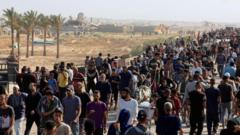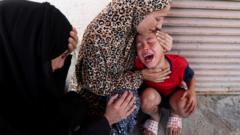Pope Francis, who has been hospitalized for nearly a month, shows signs of recovery but faces a complex health situation requiring continued medical attention.
Pope Francis' Health Shows Improvement Amid Ongoing Treatment

Pope Francis' Health Shows Improvement Amid Ongoing Treatment
The Vatican announces that Pope Francis is no longer in imminent danger but requires additional hospital care as he battles pneumonia and other health issues.
The Vatican confirmed that Pope Francis, aged 88, has shown improvement and is no longer considered to be in immediate danger from pneumonia and other infections. This announcement comes as the pontiff remains in the Agostino Gemelli Polyclinic in Rome, where he has been receiving treatment since February 14. Despite the good news, doctors have noted that the pope will need further days of care in the hospital due to the seriousness of his respiratory infection impacting both lungs.
For weeks, the prognosis for Pope Francis was described as "guarded," owing to his significant health challenges, which had left him requiring oxygen and support for his breathing. However, his recent responsiveness to medicinal therapy and stable blood tests led healthcare providers at the Vatican to feel encouraged by his progress, with improvements deemed "further consolidated."
While in the hospital, Pope Francis has continued to engage in his spiritual duties, attending virtual sessions and sending messages of condolence to those affected by disasters in Argentina. He has also managed to meet with top Vatican officials and communicate with the public, despite his ongoing health issues causing him to deliver messages with a noticeably weakened voice.
Despite the positive developments, the Vatican has refrained from providing a specific timeframe for the pope's release, emphasizing that his condition remains complex. Given his medical history, including a previous lung complication and other chronic conditions, caution continues to be the theme surrounding discussions of his health and the operational stability of the Catholic Church during this uncertain time. With the pope's health under constant scrutiny, prayer vigils and rosaries have been held by faithful Catholics worldwide, seeking guidance and healing for their leader.
For weeks, the prognosis for Pope Francis was described as "guarded," owing to his significant health challenges, which had left him requiring oxygen and support for his breathing. However, his recent responsiveness to medicinal therapy and stable blood tests led healthcare providers at the Vatican to feel encouraged by his progress, with improvements deemed "further consolidated."
While in the hospital, Pope Francis has continued to engage in his spiritual duties, attending virtual sessions and sending messages of condolence to those affected by disasters in Argentina. He has also managed to meet with top Vatican officials and communicate with the public, despite his ongoing health issues causing him to deliver messages with a noticeably weakened voice.
Despite the positive developments, the Vatican has refrained from providing a specific timeframe for the pope's release, emphasizing that his condition remains complex. Given his medical history, including a previous lung complication and other chronic conditions, caution continues to be the theme surrounding discussions of his health and the operational stability of the Catholic Church during this uncertain time. With the pope's health under constant scrutiny, prayer vigils and rosaries have been held by faithful Catholics worldwide, seeking guidance and healing for their leader.


















